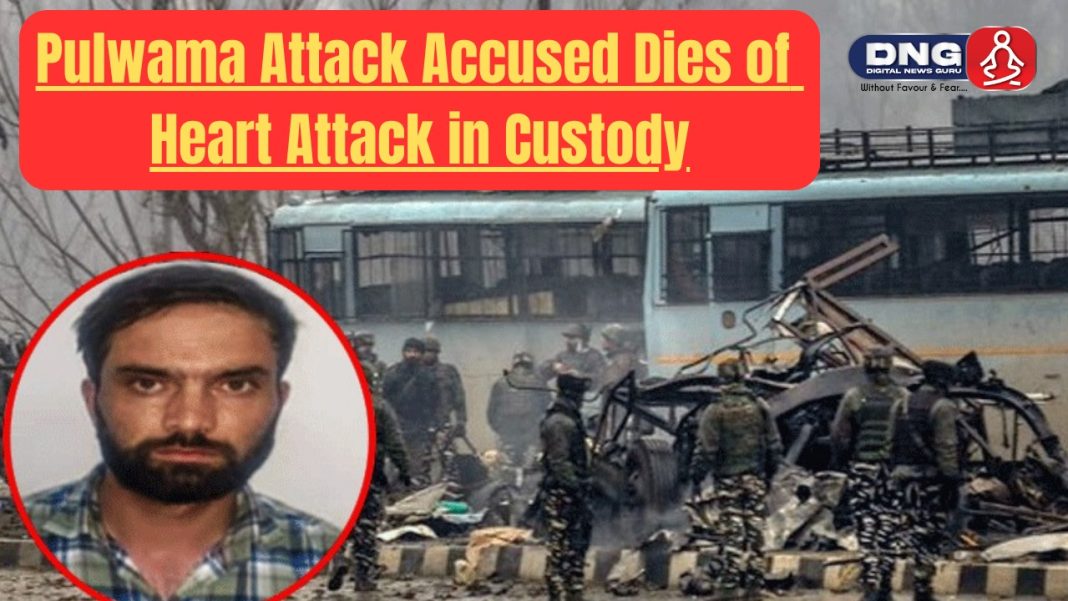DIGITAL NEWS GURU JAMMU AND KASHMIR DESK:
Pulwama Attack Accused Dies of Heart Attack in Custody
In a significant development, Bilal Ahmad Kuchey, one of the accused in the 2019 Pulwama terror attack, passed away due to a heart attack while in custody in Jammu on September 24, 2024.
This incident has garnered widespread attention, reigniting discussions surrounding the Pulwama attack, the handling of terror suspects, and conditions in custody for accused persons.
Here’s an in-depth look at the circumstances surrounding Kuchey’s death, his role in the Pulwama attack, and the broader implications for the investigation and public sentiment.
The Pulwama Terror Attack: A Recap
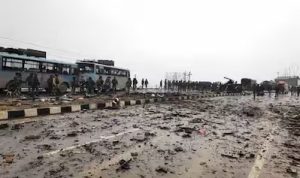
The Pulwama terror attack was one of the deadliest assaults on Indian security forces in recent history. On February 14, 2019, a suicide bomber targeted a convoy of the Central Reserve Police Force (CRPF) on the Jammu-Srinagar highway, resulting in the death of 40 CRPF personnel. The attacker, identified as Adil Ahmad Dar, rammed an explosive-laden vehicle into the convoy. The attack, which was later claimed by the Pakistan-based militant group Jaish-e-Mohammed (JeM), led to widespread national and international outrage, further straining diplomatic relations between India and Pakistan.
Bilal Ahmad Kuchey was among several individuals arrested in connection with the attack. While his specific role was not as prominent as some of the other accused, he was alleged to have been involved in providing logistical support to the attackers, helping facilitate the movement of explosives, and providing safe houses to the militants involved in the planning and execution of the attack.
The Death of Bilal Ahmad Kuchey
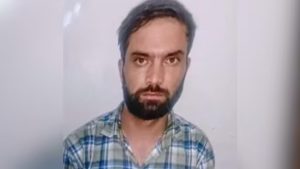
According to official reports, Bilal Ahmad Kuchey, aged 32, suffered a cardiac arrest while in police custody and was rushed to a hospital in Jammu. Despite efforts to revive him, he was declared dead at the hospital. Kuchey had been in custody for several months as the investigation into the Pulwama attack continued.
Investigation and Legal Proceedings
Kuchey’s death in custody raises several questions regarding the health monitoring of terror suspects, as well as the overall conditions of those detained in high-profile terror cases. Initial reports suggest that Kuchey had a history of heart-related health issues, but questions remain about whether appropriate care was provided while he was in detention.
While heart attacks can be sudden and unpredictable, the death of an accused in such a sensitive and high-profile case will likely prompt demands for a thorough investigation into the circumstances of his death. Custodial deaths, especially those involving accused persons in terror cases, often lead to public outrage and demands for accountability, particularly from human rights organizations and civil liberties groups.
The Indian government, on its part, has stated that proper medical protocols were followed, and that Kuchey’s death was the result of natural causes. However, given the sensitivities surrounding the Pulwama attack, there will likely be an internal investigation to ensure transparency and address any concerns about Kuchey’s treatment while in custody.
Implications for the Pulwama Investigation
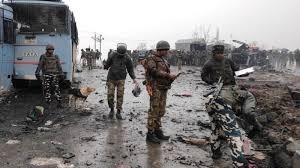
The death of Kuchey comes at a time when the investigation into the Pulwama attack is still ongoing. Several other accused, including individuals linked to Jaish-e-Mohammed, are either in custody or being pursued by Indian security forces. The National Investigation Agency (NIA), which has been leading the investigation, has been working to uncover the full network behind the attack, including cross-border links to Pakistan-based terror groups.
While Kuchey’s death will not necessarily halt the progress of the investigation, it does raise concerns about the fate of other suspects and their treatment in custody. The NIA and other investigative agencies may face heightened scrutiny, both domestically and internationally, regarding the care of accused individuals and the need to ensure that justice is served without compromising human rights.
Public Reaction and Political Fallout
The Pulwama attack remains a deeply emotional and politically charged issue in India. The attack’s anniversary is commemorated with tributes to the fallen soldiers, and the incident has been a focal point in political discourse around national security, India-Pakistan relations, and counter-terrorism efforts.
Kuchey’s death is likely to stir renewed emotions among the families of the CRPF personnel who were killed in the attack, as well as the general public. Many will demand that the investigation into the attack continues without delay, ensuring that all those responsible are brought to justice. On the other hand, the government will likely face calls to ensure that custodial conditions, even for those accused of serious crimes like terrorism, meet international human rights standards.
Opposition parties may also seize on this development, questioning the government’s handling of the Pulwama investigation and accusing it of either mismanagement or negligence in the treatment of suspects. At the same time, there will be pressure on the Narendra Modi-led government to ensure that no stone is left unturned in pursuing justice for the Pulwama victims, while maintaining the rule of law in the treatment of those accused.
Broader Context: India-Pakistan Relations and Counter-Terrorism
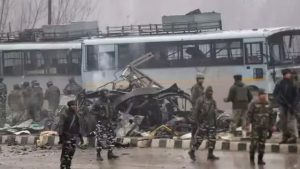
The Pulwama attack had a profound impact on India-Pakistan relations, leading to a military standoff and the subsequent Balakot airstrike by Indian forces on Pakistani soil. The incident further heightened tensions between the two nuclear-armed neighbors and led to international calls for de-escalation. Even five years after the attack, the reverberations continue to influence India’s foreign policy, particularly in terms of its stance toward Pakistan and the issue of cross-border terrorism.
Kuchey’s death is unlikely to have a direct impact on diplomatic relations, but it underscores the continued challenges India faces in tackling terrorism and securing justice for those affected by such attacks. The Pulwama case serves as a reminder of the complex nature of counter-terrorism efforts, which often involve protracted investigations, cross-border dynamics, and the need for both strong security measures and judicial integrity.
Conclusion
The death of Bilal Ahmad Kuchey, an accused in the 2019 Pulwama terror attack, brings to the forefront the complexities of dealing with terror suspects in custody. While his death appears to be from natural causes, it has reignited debates around custodial care, human rights, and the ongoing investigation into one of the most significant terror attacks in India’s recent history. As the investigation into the Pulwama attack progresses, Kuchey’s death will likely remain a point of discussion, particularly in terms of ensuring transparency, justice, and accountability at every stage of the process.
YOU MAY ALSO READ: “Laapataa Ladies” Selected as India’s Official Entry for Oscars 2025



